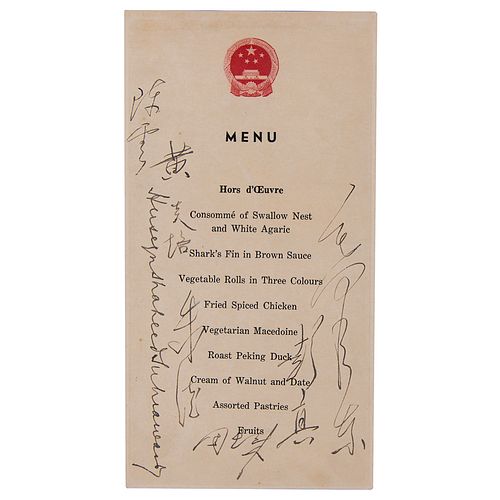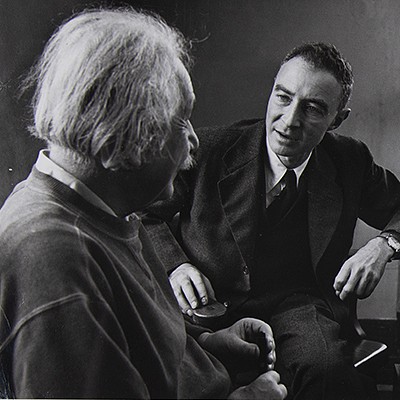Mao Zedong, Zhou Enlai, and Chinese Statesmen Signed Menu from First Pakistani State Visit to China (1956)
Two ways to bid:
- Leave a max absentee bid and the platform will bid on your behalf up to your maximum bid during the live auction.
- Bid live during the auction and your bids will be submitted real-time to the auctioneer.
Bid Increments
| Price | Bid Increment |
|---|---|
| $0 | $5 |
| $50 | $10 |
| $200 | $25 |
| $500 | $50 |
About Auction
Dec 6, 2023
Boasting 500+ rare and remarkable lots, RR Auction's December Fine Autographs and Artifacts sale features special sections dedicated to World War II and Science & Technology. RR Auction support@rrauction.com
- Lot Description
Remarkable and historic official menu from the state banquet honoring the first Pakistani state visit to China, held in Beijing on October 19, 1956, one page, 4.5 x 8.5, signed in fountain pen by six powerful Chinese statesmen—Mao Zedong, Zhou Enlai, Huang Yanpei, Peng Zhen, Chen Yun, and Zhu De—as well as Prime Minister Huseyn Shaheed Suhrawardy of Pakistan. The menu bears a state insignia printed at the head of the sheet, and lists a delectable menu of exotic offerings: "Consommé of Swallow Nest and White Agaric, Shark's Fin in Brown Sauce, Vegetable Rolls in Three Colours, Fried Spiced Chicken, Vegetarian Macedoine, Roast Peking Duck, Cream of Walnut and Date, Assorted Pastries, Fruits." The signed menu is mounted, handsomely matted in red cloth, and framed to an overall size of 15 x 18.5. In fine condition.
Suhrawardy, a scion of one of British Bengal's most prominent Muslim families, had taken office as prime minister only one month earlier, and aimed to cultivate pragmatic ties with Communist China. In addition to the two heads of state—Mao Zedong and Huseyn Shaheed Suhrawardy—this card is signed by some of China's most influential statesmen, responsible for developing it into a modern nation: Zhou Enlai (1898-1976, the official host and Premier of the PRC), Huang Yanpei (1878-1965, Vice Premier of the State Council and Minister of Industry since 1954), Peng Zhen (1902-97, Mayor of Beijing, deposed in 1966 but rehabilitated in 1979 and later Chairman of the National People's Congress), Chen Yun (1905-95, leading economic politician, Party Vice Chairman and later one of the major architects and important policy makers for the Chinese economic reform), and Zhu De (1886-1976, Vice Chairman of the Communist Party and of the PRC, long the Commander-in-Chief of the People's Liberation Army and Mao's military advisor since the 1930s).
During this first visit to China by a Pakistani Prime Minister, the delegations discussed matters such as the exchange of goods (coal for cotton) and industrial development, improvements in water management, and the training of engineers. In his conversation with Suhrawardy, Zhou sought to dispel fears of Chinese hegemony: China herself, he pointed out, had suffered under Western colonialism and now wished to pursue industrial development in the spirit of peaceful co-existence with all countries, based on mutual respect. Zhou insisted to a skeptical Suhrawardy that the education of the current generation of Chinese political leaders would ensure that future generations would not commit war or aggression. A remarkable and historic piece, representing the foundation of the relationship between China and Pakistan that remains strong to this day. - Shipping Info
-
Bidder is liable for shipping and handling and providing accurate information as to shipping or delivery locations and arranging for such. RR Auction is unable to combine purchases from other auctions or affiliates into one package for shipping purposes. Lots won will be shipped in a commercially reasonable time after payment in good funds for the merchandise and the shipping fees are received or credit extended, except when third-party shipment occurs. Bidder agrees that service and handling charges related to shipping items which are not pre-paid may be charged to a credit card on file with RR Auction. Successful international Bidders shall provide written shipping instructions, including specified Customs declarations, to RR Auction for any lots to be delivered outside of the United States. NOTE: Declaration value shall be the item’(s) hammer price and RR Auction shall use the correct harmonized code for the lot. Domestic Bidders on lots designated for third-party shipment must designate the common carrier, accept risk of loss, and prepay shipping costs.
-
- Buyer's Premium



 EUR
EUR CAD
CAD AUD
AUD GBP
GBP MXN
MXN HKD
HKD CNY
CNY MYR
MYR SEK
SEK SGD
SGD CHF
CHF THB
THB












